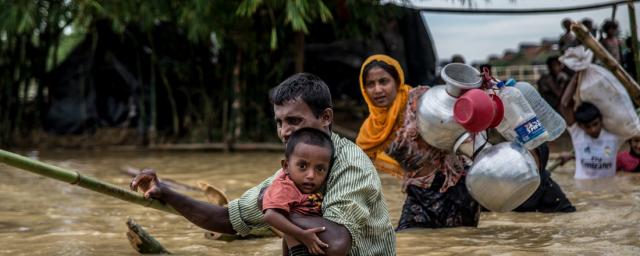
A father carries his son across a broken bridge on the edge of Balhukali camp, Bangladesh. Heavy rains flooded the areas where people had set up temporary shelters, forcing them to move to higher ground. Photo: Aurélie Marrier d’Unienville
Close to a million Rohingya people, more than half of them children, have fled violence in Myanmar to seek refuge across the border in Bangladesh. 70% of the refugees are without adequate shelter and half have no safe drinking water. This is a massive humanitarian crisis. Oxfam is responding, but we need your help.
Packed beyond limits: The largest refugee camp in the world
More than 700,000 Rohingya refugees have arrived from Myanmar's Rakhine State in Bangladesh’s south-eastern districts since August 2017. They've joined hundreds of thousands who were already living in refugee camps or with local communities. 600 000 people are squashed into the main camp, an area far too small to accommodate their numbers. More than half of them are women and girls, 60 percent are children under 18.
Many have arrived injured and deeply traumatized by their experiences, with just the clothes on their backs. They need food, clean water and shelter to survive, but above all they need to feel safe. People are living in makeshift tents in hugely overcrowded settlements at risk of floods and landslides. Conditions in the camps are woefully inadequate and unhealthy, with overflowing latrines and contaminated water. They’re largely unlit and dangerous at night – women, girls, and children are particularly vulnerable to abuse, exploitation, and trafficking.
Oxfam's response
Oxfam and other humanitarian organizations are focusing on how to create long term sustainable refugee camps for people. We are providing water and sanitation and adapting to better deal with the crowded conditions and sheer numbers of people.
- We are installing a sewage facility which will initially serve 50,000 people, which will rise to 100,000.
- We are drilling wells and installing water points, toilets and showers. To help local communities cope with water shortages, we are providing around 385,000 liters of chlorinated water daily in the Teknaf area.
- We’re helping people stay healthy and hygienic by distributing soap and other essentials, and working with community-based volunteers to emphasize the importance of clean water and good hygiene.
- We have installed solar-powered lights around the camps and provided torches and portable solar lanterns so that refugees – especially women – feel safer leaving their shelters after dark to reach water points and toilets.
- We’re also providing 24,000 households with vouchers that can be exchanged at local markets for nutritious vegetables and ingredients to supplement their basic rations.
So far, we have reached at least 266,000 people. You can help us scale up our response to 300,000.